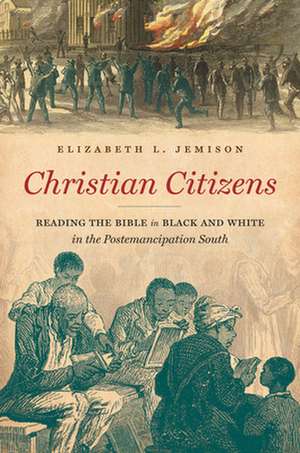Christian Citizens
Autor Elizabeth L. Jemisonen Limba Engleză Hardback – 29 noi 2020
Black evangelicals saw the argument for their identities as Christians and as fully endowed citizens supported by their readings of both the Bible and U.S. law. The Bible, as they saw it, prohibited racial hierarchy and Amendments 13, 14, and 15 advanced equal rights. Countering this, white evangelicals continued to emphasize a hierarchical paternalistic order that, shorn of earlier justifications for placing whites in charge of blacks, now fell into the defense of an increasingly violent white supremacist social order. They defined aspects of Christian identity so as to suppress black equality--even praying, as Jemison documents, for wisdom in how to deny voting rights to blacks. This religious culture has played into remarkably long-lasting patterns of inequality and segregation.
Preț: 584.47 lei
Preț vechi: 759.06 lei
-23% Nou
Puncte Express: 877
Preț estimativ în valută:
111.85€ • 121.45$ • 93.96£
111.85€ • 121.45$ • 93.96£
Carte tipărită la comandă
Livrare economică 23 aprilie-07 mai
Preluare comenzi: 021 569.72.76
Specificații
ISBN-13: 9781469659688
ISBN-10: 1469659689
Pagini: 256
Dimensiuni: 155 x 235 mm
Greutate: 0.55 kg
Editura: The University of North Carolina Press
ISBN-10: 1469659689
Pagini: 256
Dimensiuni: 155 x 235 mm
Greutate: 0.55 kg
Editura: The University of North Carolina Press
Descriere
With emancipation, a long battle for equal citizenship began. Bringing together the histories of religion, race, and the South, Elizabeth Jemison shows how southerners, black and white, drew on biblical narratives as the basis for very different political imaginaries during and after Reconstruction.
